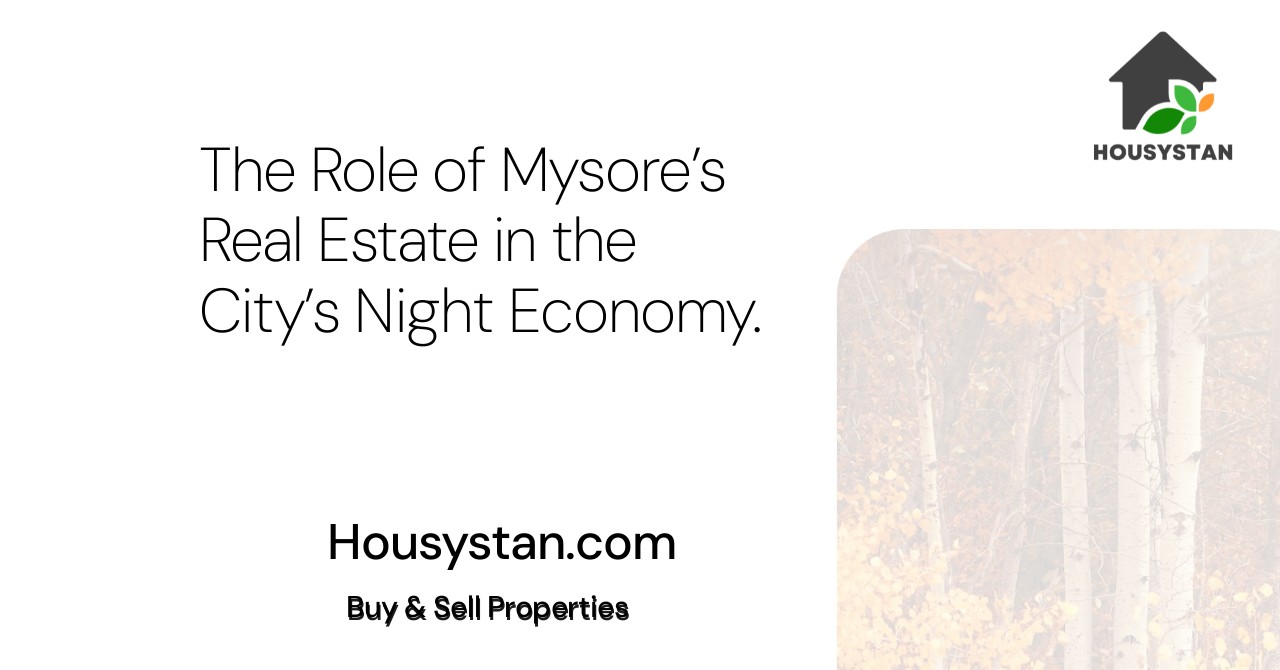The Role of Mysore’s Real Estate in the City’s Night Economy
Read latest blogs and articles from Housystan

The Information mentioned here was last updated on:
21/2/2026The Role of Mysore’s Real Estate in the City’s Night Economy
Introduction: Unveiling Mysore’s Vibrant Night Economy
Mysore, celebrated for its regal architecture, rich heritage, and cultural festivities, is steadily carving out a niche as a vibrant night-time destination. From bustling food streets to illuminated palaces and cultural hubs, the city’s after-dark economic activities are expanding, drawing attention from locals and visitors alike. At the heart of this transformation lies Mysore’s flourishing real estate sector, which plays a pivotal role in shaping the city’s night economy. As Mysore evolves, it’s crucial to understand how real estate development is influencing, and being influenced by, the city’s night-time vibrancy.
- Verified Tenants/Buyers
- Unlimited Property Listing
- Zero subscription/charges fee
Understanding Mysore’s Night Economy
The concept of the night economy refers to all economic activity that occurs between 6 pm and 6 am. In Mysore, this includes a wide array of businesses: restaurants, pubs, late-night markets, entertainment venues, and cultural events. The city’s signature attractions—like the illuminated Mysore Palace and the bustling Devaraja Market—draw crowds long after sunset, fueling demand for evening services and amenities. The night economy doesn’t just boost tourism; it also creates jobs, enhances city life, and spurs urban development.
The Real Estate Sector: Foundation of Night-Time Growth
Real estate is the backbone upon which Mysore’s night economy thrives. Commercial spaces, high-street retail, mixed-use developments, and hospitality projects are foundational in supporting nightlife venues and late-night businesses. The availability of modern infrastructure, well-located properties, and flexible zoning regulations has encouraged entrepreneurs to invest in restaurants, entertainment centers, and boutique hotels that cater to after-dark crowds.
Transforming Neighborhoods into Night-Time Hotspots
Several neighborhoods in Mysore have emerged as prime locations for night-time activities, thanks to targeted real estate development. Areas like Vani Vilas Mohalla, Jayalakshmipuram, and the vicinity of Chamundi Hill now host a diverse range of cafes, bistros, and night markets. Developers are responding to the demand for accessible, secure, and attractive properties by upgrading commercial spaces and enhancing public amenities. This, in turn, creates a virtuous cycle—improved real estate draws more businesses, which attract larger crowds, further boosting property values and investment in the area.
Hospitality and Accommodation: Fueling the Night-Time Economy
The hospitality sector is a significant driver of Mysore’s night economy. The city’s hotels, guesthouses, and serviced apartments cater not only to tourists but also to business travelers attending conferences, weddings, and cultural festivals. Real estate developers have seized the opportunity by investing in boutique hotels, heritage stays, and modern accommodation options near night-time attractions. Proximity to popular night spots has become a key selling point, with developers designing properties that offer easy access to late-night entertainment, dining, and cultural experiences.
Retail and Dining: The Pulse of the Evening
Restaurants, cafes, and street food vendors form the heart of Mysore’s night economy, and their success is closely tied to real estate dynamics. Prime commercial spaces near tourist hotspots, busy intersections, and historical landmarks are highly sought after. Property developers have recognized this trend, integrating food courts, rooftop lounges, and open-air dining spaces into new projects. Retail zones are also extending their hours, offering shoppers the chance to explore Mysore’s unique blend of traditional and modern offerings well into the evening.
Entertainment and Cultural Venues: New Realms After Dark
Mysore’s reputation as a cultural capital is enhanced by its vibrant entertainment scene. Theaters, art galleries, and performance spaces are increasingly hosting night-time events, from classical concerts to indie film screenings. Real estate developers are partnering with cultural organizations to create multi-purpose venues that serve daytime and night-time audiences alike. These spaces not only enrich the city’s cultural fabric but also drive foot traffic, increase demand for nearby commercial properties, and elevate Mysore’s profile as a destination for after-hours entertainment.
Safety, Accessibility, and Urban Planning
For a thriving night economy, safety and accessibility are paramount. Real estate developers and city planners are collaborating to create well-lit, pedestrian-friendly environments. Investments in infrastructure—such as improved lighting, CCTV surveillance, and reliable public transport—make night-time activities more appealing and secure. Mixed-use developments that blend residential, commercial, and recreational spaces foster a sense of community, making neighborhoods lively and safe even after dark.
Challenges and Opportunities for Sustainable Growth
Despite its progress, Mysore’s night economy faces challenges. Zoning restrictions, noise regulations, and limited late-night public transport can constrain growth. However, these hurdles also present opportunities for innovative real estate solutions. Developers are experimenting with soundproofing technologies, adaptive reuse of heritage buildings, and flexible property layouts to accommodate diverse night-time uses. Sustainable development practices—such as green buildings and waste management systems—are also gaining traction, ensuring that the city’s growth doesn’t compromise its environmental or cultural heritage.
Investment Trends: Real Estate as a Magnet for Night-Time Enterprises
Investors are increasingly recognizing the potential of Mysore’s night economy. High returns on commercial properties, particularly those near major attractions or in emerging nightlife districts, are attracting both local and national players. The rise of co-working spaces, pop-up markets, and experiential retail is adding new dimensions to the real estate landscape. As demand for innovative spaces grows, developers are prioritizing flexibility, technology integration, and customer experience to stay ahead in a competitive market.
Conclusion: The Symbiotic Future of Real Estate and Night Economy
Mysore’s real estate sector is inextricably linked to the city’s night economy, fueling growth, diversity, and vibrancy after sunset. As the city continues to evolve, strategic investments in commercial, hospitality, and cultural spaces will unlock new opportunities for entrepreneurs, investors, and residents. By fostering a supportive environment for night-time businesses and prioritizing inclusive, sustainable development, Mysore is poised to become a model for how real estate can shape a city’s cultural and economic life after dark.